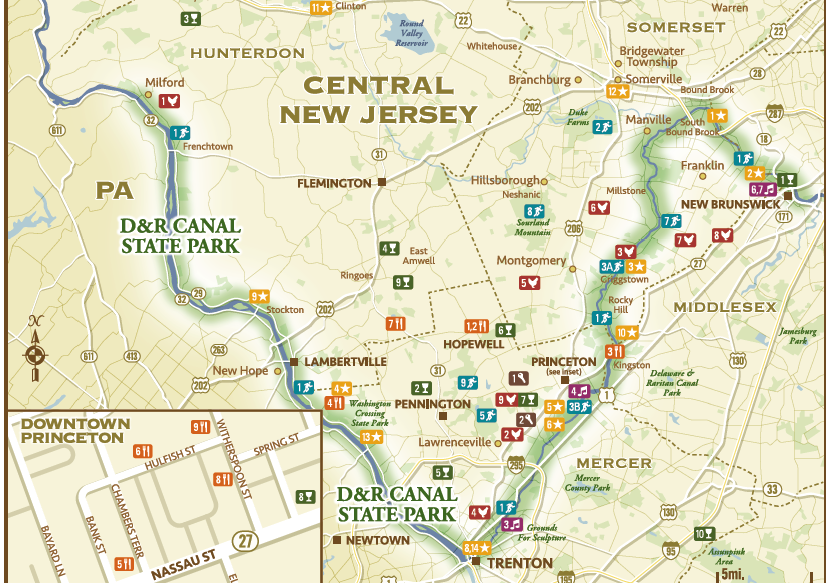Central Jersey’s farms are reopening to a very different landscape this season, following the worst public health crisis in a century that fundamentally changed Americans’ relationship to food. After a year of being cooped up at home with time to spare, Americans are cooking more, and they have a greater interest in healthier, fresher, and locally grown food.
“We had fewer customers during the pandemic, but they browsed less and bought more,” said Pam Mount of Terhune Orchards and Winery, in Lawrence, where her family has been farming for more than four decades. Pam believes new “buy local” habits will last. “It was more local people, fewer tourists, and they really appreciated the freshness you won’t find in a supermarket.”

Terhune’s winery will continue “Sips and Sounds” in an old apple orchard.
Whether you live in Central Jersey or in the nearby cities and suburbs of New York and Philadelphia, the Garden State offers convenient access to wholesome fun and food.
Sticking with Pandemic Innovations
Like many farms, Terhune Orchards made some pandemic innovations they expect to keep, such as a online shopping and a wine tasting area in an aging orchard that no longer produces apples but creates a nice ambiance.
Another farm that is sticking with its pandemic innovations is Norz-Hill Farm in Hillsborough. In response to the pandemic, they quickly expanded to meet the demand for local food with a large tent to provide open-air shopping of meat, eggs, and produce produced on their farm and nearby. Owners Rich and Debbie Norz expect the demand for local food will continue, justifying the larger retail space.
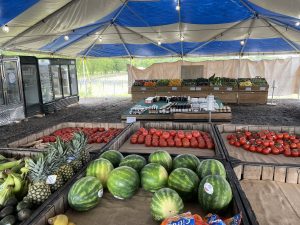
Open air shopping continues at Norz-Hill Farm.
Consumer research suggests farmers should expect continued strong demand. According to a Hunter market research study, 71% of consumers expect to cook more even after the pandemic is over. They say the reasons are saving money (67%), eating healthier (56%), and feeling better (56%).
While many retailers suffered during the pandemic, many on-farm markets did well because of the generally less crowded, better ventilated, and outdoor experiences they offered.
Those factors helped Hidden Spring Lavender in Skillman increase sales in 2020 versus 2019. The business is focused on a wide range of lavender and alpaca wool products. “Customers started to visit the farm by word of mouth and liked the idea of being outside and visiting with the alpacas,” said owner Marie Voorhees. “Customers also appreciated the fact that all of our Lavender Products are made right here on the farm, and they wanted to support small business.”
Humane, Small-Scale Meat Processing
The pandemic brought new attention to the problems with “factory farming,” particularly large scale meat processing plants where sanitation and working conditions led to large outbreaks for COVID-19.
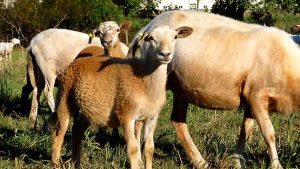
Doublebrook’s Katahdin sheep produce superior meat raised on pasture.
Doublebrook Farm in Hopewell and Griggstown Farm in Franklin both operate on-farm processing plants at a much smaller scale than you see elsewhere in the nation.
“The humane slaughter of our livestock has always been one the most important aspects of raising animals,” said Robin McConaughy who runs the farm with her husband Jon. “We take it seriously and have worked hard to make it calm, quiet and quick for the animals. We created our pens and chutes using Temple Grandin’s model to reduce stress.”
Most Central Jersey livestock is grass-fed, which benefits the animals, consumers, and the grasslands themselves which benefit from the manure fertilization by grazing animals. This is true for the organic cheese and dairy operations Bobolink Dairy and Bakehouse in Milford, Cherry Grove Farm in Lawrence, and Gorgeous Goat Creamery in Stockton, as well as the meat and poultry operations of Dogwood Farms in Basking Ridge and Doublebrook and its Brick Farm Market.
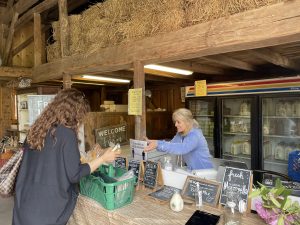
Organic veggies and meat in a historic barn at Dogwood Farms.
“Our meat sales have been very strong, and until recently, we have been just about sold out! We even have been selling the more obscure cuts since folks have more time to cook and experiment at home,” said Nina White, owner of Bobolink. “Our customers are seeking local, regenerative, ethical foods. They care about the big picture of how we treat our workers, our livestock, our land, and our wildlife!”
Wholesome, Outdoor Experiences
Another factor in the rising popularity of Central Jersey farms is the opportunity for wholesome, outdoor activities for the whole family. The “U-pick” season for berries starts with strawberries in May, followed by blueberries in June and July, blackberries in August, and finishing up with apples and pumpkins in September and October.
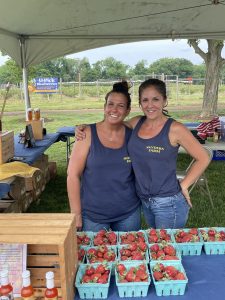
Strawberries start the season at Snyders Farm.
Some of the best “Pick Your Own” opportunities are offered by Snyders Farm in Somerset, Terhune Orchards, and Von Thun Farm in South Brunswick. All three farms also offer a variety of entertainment experiences, including farm animals to see.
As the pandemic fades and the weather keeps getting more lovely, restore your spirits by spending a day, a weekend, or even a week visiting the farms and vineyards of Central Jersey.
Use our interactive map to find all our great Central Jersey farms, as well as beverage makers, farm-to-table restaurants, historic sites, recreation ideas, and more! And be sure to follow us on Instagram and Facebook and sign up for our regular email updates.

